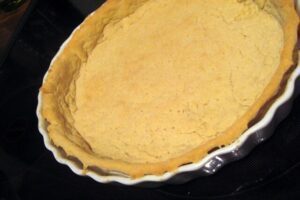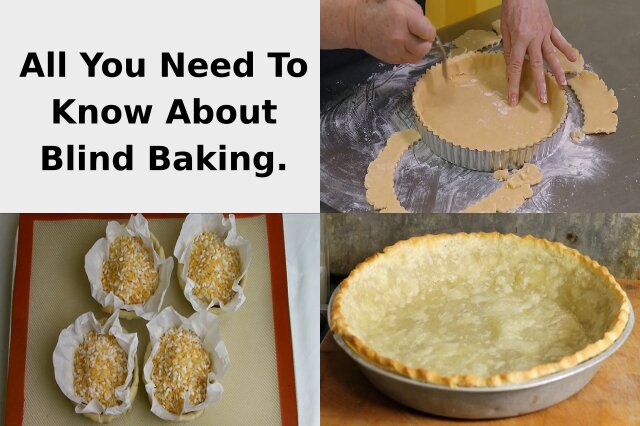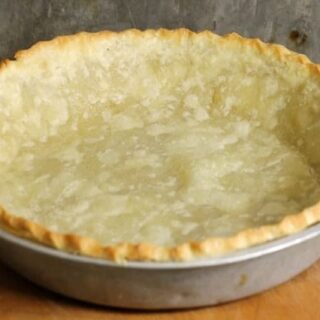If you’re new to baking, you may have heard the term “blind baking” and wondered what it means.
Blind baking is a technique used to pre-bake a pie crust before adding the filling, and it’s an important step in creating a perfectly cooked pie.
In this guide, we’ll explain everything you need to know about blind baking.
What is Blind Baking? A Comprehensive Guide

Master blind baking with this detailed step-by-step guide!
Learn useful tips, tricks and strategies to create the perfect pastry base every time.
What is blind baking?
Blind baking is a technique used in baking to pre-bake a pie crust before adding the filling.
This is done to ensure that the crust is fully cooked and doesn’t become soggy when the filling is added.
It’s especially important for pies with wet fillings, like savoury mince meat in gravy, custard or fruit, as they can cause the crust to become soggy if not pre-baked.
Blind baking involves lining the pie crust with parchment paper or aluminum foil and filling it with weights, like dried beans or rice, to prevent it from puffing up during baking.
The crust is then baked for a short period of time before the weights are removed and the filling is added.
Why is blind baking necessary?
Blind baking is necessary to ensure that the pie crust is fully cooked and doesn’t become soggy when the filling is added.
This is especially important for pies with wet fillings, like custard, meat pies or fruit, as they can cause the crust to become soggy if not pre-baked.
Blind baking also helps to prevent the crust from shrinking or puffing up during baking, which can affect the appearance and texture of the finished pie.
By pre-baking the crust, you can ensure that it is perfectly cooked and ready to hold your delicious filling.
Blind Baking Equipment
Blind baking can be tricky, but having the right equipment can make all the difference.
Check out our list of must-have tools for blind baking success.
- Pie weights;
Pie weights are small, ceramic or metal balls that are used to weigh down the crust during blind baking.
They prevent the crust from puffing up or shrinking during the baking process.
Pie weights can be reused and are dishwasher safe.When choosing pie weights, look for ones that are heat-resistant and won’t break or melt in the oven.
Ceramic or metal weights are good options.Also consider the weight of the pie weights – heavier weights will do a better job of keeping the crust from shrinking or bubbling up during baking.
Finally, make sure the pie weights are easy to clean and reusable for multiple baking sessions.
- Parchment paper;
Parchment paper is used to line the crust before adding the pie weights. It prevents the weights from sticking to the crust and makes it easier to remove them after baking.
Parchment paper can also be used to line the baking sheet for easy cleanup.When choosing parchment paper for blind baking, look for a heavy-duty, non-stick variety that can withstand high temperatures.
It should also fit the size of your baking dish or pan and be easy to handle and cut.
Some brands even offer pre-cut sheets specifically for blind baking. - Aluminum foil;
Aluminum foil can be used instead of parchment paper to line the crust.
It is especially useful for pies with a high crust that needs to be protected from burning.Foil can also be used to cover the edges of the crust to prevent them from burning.
When choosing aluminum foil for blind baking, look for heavy-duty foil that is at least 18 inches wide.
This will ensure that the foil is strong enough to hold the weight of the pie crust and prevent it from tearing or collapsing.
Additionally, choose foil that is non-stick or has a non-stick coating to prevent the crust from sticking to the foil. - Baking beans;
Baking beans are another option for weighing down the crust during blind baking.
They are small, dried beans that are placed on top of the parchment paper or foil-lined crust.
Baking beans can be reused and stored in an airtight container.When choosing dried beans for blind baking, look for beans that are uniform in size and shape, with no cracks or splits.
This will ensure that they cook evenly and hold their shape during baking.It’s also a good idea to choose beans that are relatively small, such as navy beans or black beans, as they will fit more easily into the pie crust.
- Pie crust shield;
A pie crust shield is a metal or silicone ring that is placed over the crust to protect it from burning.
It is especially useful for pies with a high crust or a filling that needs to be baked for a long time.
Pie crust shields can be reused and are dishwasher safe.When choosing a pie crust shield for blind baking, look for one that is made of heat-resistant material, such as silicone or aluminum.
It should fit snugly on your pie dish and be adjustable to fit different sizes.Some shields also have handles for easy removal from the pie.
Consider the durability and ease of cleaning as well. - Tart pan with removable bottom;
A tart pan with a removable bottom is a great option for blind baking tart crusts.
The removable bottom makes it easy to remove the crust from the pan without damaging it.
Tart pans come in various sizes and materials, such as metal or ceramic.When choosing a tart pan with a removable bottom for blind baking, look for one that is made of heavy-duty materials, has a non-stick coating, and is the right size for your recipe.
You may also want to consider the shape of the pan and whether it has a fluted edge for decorative purposes.
- Rolling pin;
A rolling pin is used to roll out the dough for the crust.
It should be sturdy and have a smooth surface to prevent the dough from sticking.
Rolling pins come in various materials, such as wood, marble, or silicone.When choosing a rolling pin for blind baking, look for one that is heavy and sturdy, with a smooth surface that won’t stick to your dough.
A tapered design can also be helpful for creating even thickness.
Consider materials like wood, silicone, or marble, and make sure the size and weight will feel comfortable for your hands.
How To Blind Bake A Pie Crust
Ingredients
- Pastry Dough
- or 1 defrosted pastry sheet
Instructions
Then follow one of the 3 following methods;
- Blind Bake Without Weights
The first method we'll show you how to blind bake without weights, this is called docking the pie crust.
Docking is the term for the simplest method of blind baking where you simply take a fork and prick the dough all over.
These holes you produce allow the steam to escape and prevents the crust from bubbling up.
The only time when you might want to use pie weights instead of docking is when the filling is very liquidy, as with quiche or other pies that will be fully baked in the oven.
It is certainly not advisable for pies with wet fillings, as these can seep through the holes and then into or under the crust itself. - Directions For Blind Baking Without Weights
- Roll out your pie dough.
- After you've rolled out the dough, using a fork, pierce the surface of the pastry dough all over making sure you get the sides too
- Throw into the preheated oven for 10 minutes or until golden.
- Blind Bake With Pie Weights
A safer method is to weigh the crust down with “pie weights.”
When using this method for a fully baked crust, the weights are removed before the pre-baking is complete in order to achieve a browned crust.
Here, the pie crust is lined with aluminium foil or parchment paper, then filled with pastry- or pie weights (sometimes called "baking beans") to ensure the crust retains its shape while baking. - Directions For Blind Baking Using Weights
- Line the base and sides of an uncooked pastry case with non-stick baking paper or foil.
- Fill it with dried beans, or rice, or macaroni elbows, or metal or ceramic baking weights.
- Place on a baking tray and cook in an oven preheated to 220°C (428°F) for 8-10 minutes.
- Remove the pastry case from the oven and remove the baking paper or foil and weights.
- Cook for a further 5-10 minutes or until light golden.
- Blind Bake Using Another Pie Pan
If you own two pie pans, you already have a perfectly shaped pie weight.
This technique dispenses with weights by placing a second pie tin on top of the crust, then inverting the tins to bake.
This will weigh down the crust and prevent it from puffing.
In this method, the crust browns between the tins. - Directions For Blind Baking Using Another Pie Pan
- Cover the dough-lined pie pan with parchment or foil.
- Place the second, empty pie pan on top.
- Place on a baking tray and cook in an oven preheated to 220°C (428°F) for 8-10 minutes.
Video
Notes
Pie Weights Substitute
Trying to blind-bake a pie, but don't have any pie weights? Not to worry!Here we provide several alternative baking solutions so you can get your crust perfectly crispy. Pie-weights are available as ceramic or metal beads, but these substitutes for pie weights can be used instead.
- Rice
- Sugar
- Dried peas
- Lentils
- Pinto beans
- Other pulses
If you save them in a labeled jar, you can use them the next time you need pie weights.
Tips for successful blind baking.
- To ensure a successful blind bake, make sure to prick the crust all over with a fork to prevent it from puffing up.
- Use parchment paper or aluminum foil to line the crust and fill it with pie weights or dried beans to prevent it from shrinking or bubbling up.
- It’s also important to keep an eye on the crust while it’s baking to prevent it from overcooking or burning.
- Once the crust is fully baked, let it cool completely before adding your filling to prevent it from becoming soggy.
Common mistakes to avoid when blind baking.
Blind baking can be a tricky technique to master, but with a little practice and attention to detail, you can avoid some common mistakes.
If docking your pastry, one mistake to avoid is not pricking the crust enough, which can cause it to puff up and create air pockets.
Another mistake is not using enough pie weights or beans to weigh down the crust, which can cause it to shrink or bubble up.
It’s also important to not overcook the crust, as this can make it too hard and difficult to cut.
By avoiding these mistakes, you can achieve a perfectly baked pie crust every time.

